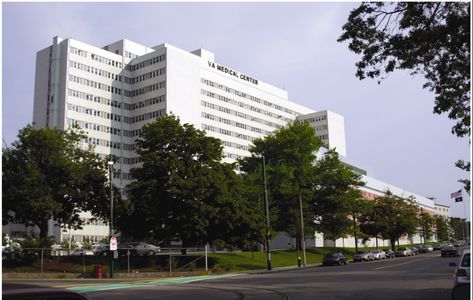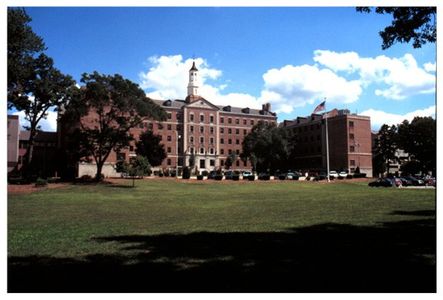Boston VA Medical Center


The VA Boston Health care System (VABHS) is the major tertiary care center for the New England Region. It hosts a number of clinical centers of excellence, advanced technology and research initiatives while providing primary care to patients from eastern Massachusetts, Cape Cod, and southern New Hampshire. The product of a 1999-2000 merger between two separate VA Hospitals, the current VABHS is dispersed among three main campuses, and runs five additional community based outpatient clinics.
The current VA Boston Healthcare System was created by a merger between VA Medical Centers in Jamaica Plain and West Roxbury, Mass. Since January 2001, all inpatient services have been located at the West Roxbury and Brockton campuses, while Jamaica Plain serves as a hub for outpatient care, offering ambulatory care and primary care services, along with community outpatient clinics in Causeway, Framingham, Lowell, Plymouth and Quincy. The inpatient service serves as the tertiary care center for VA facilities in all six New England states.
Together, VA Boston facilities provide exceptional and accessible care for more than 60,000 Veterans from the greater Boston area and across New England, as well as advancing health care through research and educating tomorrow’s healthcare providers.
Health Care and Services
VA Boston’s Brockton campus offers services including primary care, mental health, medical and surgical outpatient services, physical medicine and rehabilitation services, dental, diagnostic imagery and other specialty services, as well as palliative and hospice care, and long-term care. Jamaica Plain offers ambulatory care and primary care services, and serves as a hub for outpatient care, including ambulatory surgery, pharmacy, whole health, audiology and diagnostic imaging. West Roxbury serves as the principal tertiary inpatient medical center for New England Veterans, offering primary care, medical and surgical services, pain management, geriatrics, and a nationally recognized acute spinal cord injury program.
Research and Development
VA Boston HCS hosts one of the largest and most active research programs in VA, and 10 national centers of excellence, including the Million Veteran Program, the VA Biorepository Brain Bank, and two divisions of the National Center for PTSD: the Behavioral Science Division and Women’s Health Sciences Division. We conduct research to discover knowledge, develop VA scientists and health care leaders, and create innovations that advance health care for Veterans and the nation.
MAVERIC, the Massachusetts Veterans Epidemiology Research and Information Center, is the largest hub of research activities within the Medical Service with more than 200 staff. http://maveric.org MAVERIC is involved in a variety epidemiological studies and clinical trials, and has a thriving informatics unit supporting novel methods of investigation. The unit has more than 20 individually funded projects. It also houses a serum and tissue repository to support VA investigators across the country. MVP – Million Veterans Program is a major initiative in genetic epidemiology. MVP is collecting serum and DNA samples from 1,000,000 veterans across the country and can link to clinical data within the VA’s nationwide electronic medical record. The unit lays claim to expertise in multi-site clinical trials and is one of a select few Clinical Trials Coordinating Centers nationally in the VA Cooperative Studies Program. Their newly launched Precision Oncology Trial is a demonstration project being conducted throughout the VA New England network whereby patient specific recommendations for treatment will be made at the point of care and based upon phenotypic, genotypic and clinical outcomes of recently treated patients. Over half of the Sections in Medical Service have staff leading or collaborating on research projects in collaboration with MAVERIC. Cross disciplinary research, particularly with colleagues in mental health is vibrant.
There are many unique centers of excellence in investigation and individual experts which call VABHCS home. The Center for Healthcare Organization and Implementation Research (CHOIR) is funded as a VA Center of Innovation (COIN) >www.choir.research.va.gov< This center has programs studying recovery in behaviorally vulnerable populations, medication optimization, long term care, health services genomics and program implementation and organization evaluation. National Center for Post-Traumatic Stress Disorder (PTSD) researchers co-direct the Consortium to Alleviate PTSD, a national 5 year project to identify early interventions after post trauma exposure to prevent or mitigate adverse sequelae. Our Geriatrics Research and Education Center (GREC) is involved in exciting projects in neuro degenerative disorders including Alzheimer’s disease, traumatic encephalopathy and traumatic brain injury. There are just examples of locale expertise that welcome collaboration.
Education and Learning
VA Boston Healthcare System maintains general medicine and teaching hospitals that provide a full range of health services for Veterans, with state-of-the-art technology as well as education and research. We offer fellowships and internships in psychology, an Interprofessional Advanced Addiction Fellowship, and a Behavioral Informatics Postdoctoral Research Fellowship.
VA Boston partners with more than 100 academic affiliates, including Harvard Medical School, Boston University Chobanian & Avedisian School of Medicine, Boston College Connell School of Nursing, Northeastern University’s Bouvé College of Health Sciences, Tufts University’s Department of Occupational Therapy, and the New England College of Optometry. In all, VA Boston trains more than 2,000 future health professionals annually.
Quality Improvement: Staying strong and getting better.
A dedicated Chief Resident in Quality and Safety, a block rotation for senior residents and a medical student on ambulatory medical rotation, supervised by 3 dedicated medical faculty highlight the emphasis and commitment the Medical service at VA Boston places on Quality and Safety education. Based at VA Boston, The New England Veterans Engineering Resource Center (VERC) >www.newengland.va.gov/verc/< brings the experience of systems engineering to work collaboratively within throughout the institution to further improve hospital systems. NE VERC is one of four such centers in the country. Faculty from VERC collaborate in both educational as well as project work with our trainees and staff.